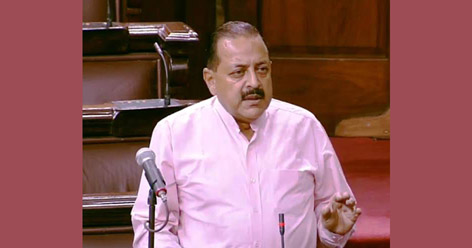Excelsior Correspondent
NEW DELHI, July 22: Union Minister of State (Independent Charge) Science & Technology, Minister of State (Independent Charge) Earth Sciences, MoS PMO, Personnel/DoPT, Public Grievances, Pensions, Atomic Energy and Space, Dr Jitendra Singh today informed the Rajya Sabha that 19 States of India are using satellite communication for education.
In reply to a question, the Minister, who is also In-Charge Department of Space and ISRO, stated that besides the 19 States, the Andaman & Nicobar Islands are also beaming the education contents in digital mode under the Teli-education Programme of Department of Space and ISRO.
The reply further stated that the Bhaskaracharya National Institute for Space Applications and Geo-informatics (BISAG-N) is also beaming 51 educational channels using satellite communication.
In addition to this, the Space sector also opened Indian Institute of Remote Sensing and is actively involved in training beneficiaries (such as UG/PG and Doctorate students, working professionals, academicians, school teachers and school students) on Space Technology and its Applications using digital platforms.
In response to another question, Dr Jitendra Singh disclosed that ever since the Government’s recent decision to open up the Space sector to private players, 27 proposals from private entities have been received so far for undertaking various Space activities in India. The type of proposals include include building and launching of Launch vehicles, building, owning and operating Satellites, providing Satellites based services, establishing Ground segments, Research Partnerships and providing Mission services.
The global Space economy, as per the reply, is poised to grow over a trillion USD in the next two decades. With the space sector reforms, Indian Private Space Industry is slated to contribute to the core elements of global space economy ? space-based services, launch services, manufacturing of launch vehicles and satellites, establishment of ground segment and launch infrastructure ? to a considerable extent.
Participation of the private sector including academic institutions, start-ups and industries in end-to-end Space activities is expected to expand the national space economy, generate more employment opportunities and create better manufacturing facilities.
Trending Now
E-Paper


